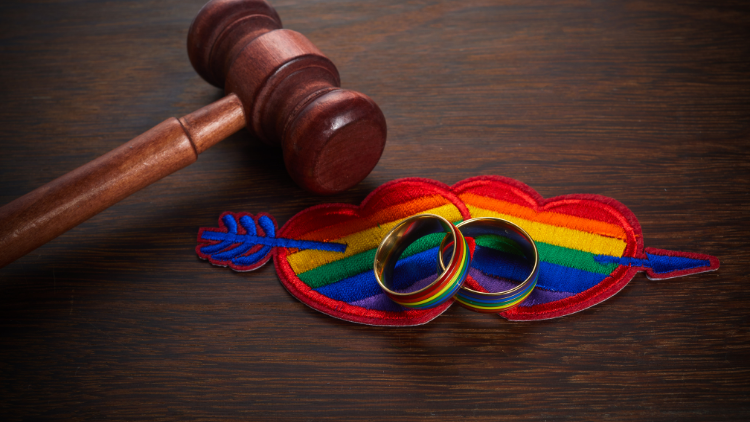Human Rights
India's Ruling on Same-Sex Marriage

Legalize LGBTQ Marriage
© By Vetrestudio via Canva ProThe Supreme Court of India, led by Chief Justice DY Chandrachud, has issued a unanimous verdict against legalizing same-sex marriage in India, along with a 3:2 ruling against civil unions for non-heterosexual couples. The Court asserted that current laws do not acknowledge these rights, emphasizing that it is the prerogative of Parliament to enact laws enabling such unions.
Chief Justice Chandrachud deferred the decision to Parliament, emphasizing that the Court cannot alter provisions of the Special Marriage Act. The focus of the case was on interpreting this Act in a gender-neutral manner to include same-sex marriages. Justice Kaul of the Supreme Court viewed legal recognition of civil unions as a step towards marriage equality, but all five judges concurred that there is no inherent right to marry. The majority opinion maintains that Parliament should determine the inclusion of same-sex marriage.
While the five-judge bench unanimously decided against legalizing same-sex marriage in India, it notably acknowledged the importance of protecting non-heterosexual unions under the Constitution. This verdict, although not granting marriage rights, is seen as a significant stride towards recognizing and affirming LGBTQIA+ rights in India and beyond. The Court's minority opinion, delivered by Chief Justice Chandrachud and Justice Kaul, argued that queer couples have the right to enter into civil unions, even if they do not have the right to marry under existing laws. The minority opinion emphasized that freedom for the queer community to enter unions is constitutionally guaranteed, and any denial of these rights constitutes a violation of fundamental rights. This historic assertion of queer and Trans rights marks a shift in global perceptions of LGBTQIA+ issues, illustrating India's leadership in this realm.
Years of Advocacy Culminate in a Historic Verdict
This development is the result of tireless advocacy, with activists, organizations, and individuals tirelessly championing the cause of LGBTQIA+ rights across India and the South Asian continent. The verdict, a testament to the collective dedication, reflects a progressive outlook that acknowledges the vibrant diversity that defines our region.
Existing Challenges in South Asia:
- In many South Asian nations, deeply ingrained societal attitudes towards non-heteronormative orientations and gender identities perpetuate discrimination, ostracization, and violence against LGBTQIA+ individuals.
- LGBTQIA+ individuals across numerous South Asian countries face vulnerability to discrimination in critical aspects of life, including employment, housing, and education, due to the widespread absence of comprehensive legal protections.
- Balancing the traditional values with progressive LGBTQIA+ rights in South Asia proves to be a delicate task, given the region's diverse cultural and religious landscape. This often leads to complex intersections and dynamics.
- The recognition and safeguarding of transgender rights remain pressing concerns across the region. Immediate attention is needed in areas such as healthcare accessibility, legal recognition, and protection from discrimination.
The Road Ahead:
While the reading of the judgment is momentous, it is essential to acknowledge that there is still much work to be done. It is imperative that legal frameworks, policies, and practices are aligned to ensure that LGBTQIA+ individuals can exercise their rights without hindrance.
What is missing: Potential Steps to be taken in South Asia for LGBTQIA+ Rights
Comprehensive Anti-Discrimination Legislation: South Asian countries should consider enacting comprehensive anti-discrimination laws explicitly protecting LGBTQIA+ individuals from discrimination in various aspects of life, including employment, education, and housing.
Inclusive Education: The introduction of inclusive curricula that educate students about LGBTQIA+ issues is recommended. This can foster understanding, acceptance, and empathy from a young age. This step will contribute to creating a more tolerant and inclusive society across the region.
Healthcare Access: Prioritize providing LGBTQIA+ individuals with access to high-quality healthcare that caters to their specific needs. This includes attending to matters concerning mental health, gender-affirming services, as well as prevention and treatment of HIV/AIDS.
Recognition of Non-Binary Identities: Although self-determination of gender is in itself a hurdle, wherever possible, it is essential to consider extending legal recognition to non-binary and genderqueer individuals as a crucial step towards acknowledging and respecting the diverse spectrum of gender identities across South Asia.
Transgender Rights: Consider examining the potential for strengthening legal protections for transgender individuals, including rights related to gender identity, healthcare, and employment, which can greatly enhance the inclusivity in South Asian society.
Hope: A Brighter and More Inclusive Future for South Asia
This landmark ruling in India, although not in favor of same-sex marriage or adoption, can be viewed as a beacon of hope for the entire South Asian region. The journey towards true equality for LGBTQIA+ individuals continues, and it is a journey that requires collaborative efforts. This is neither the end nor the beginning.
